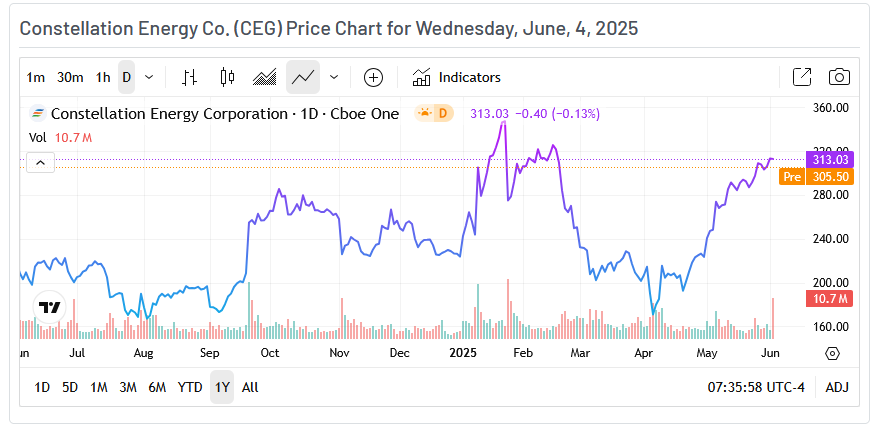Before the market’s open on June 3, Constellation Energy (NASDAQ:), a nuclear energy giant, announced a new deal with AI hyperscaler Meta Platforms (NASDAQ:). This comes just days after a report from the Wall Street Journal stated that Meta aims to allow marketers to fully automate ad creation by the end of 2026. Meta’s Advantage+ Creative tool helps marketers create ads using AI. These ads appear to users on Facebook and Instagram.
The agreement between Constellation and Meta doesn’t begin until mid-2027. However, both of these moves signal Meta’s huge commitment to AI and Constellation’s importance in enabling it. According to data from Nasdaq (NASDAQ:), Constellation shares reached a pre-market high of $363 after the news broke. That is a rise of nearly 16% from the stock’s closing price on the previous day. However, shares were slightly down by the time the market closed.
CEG: Meta Agreement Keeps Clinton Site Running, Provides Expansion Opportunities
Meta and Constellation have announced the signing of a 20-year power purchase agreement (PPA), which covers over 1.1 gigawatts (GW) of nuclear energy. The agreement would allow Constellation’s Clinton Clean Energy Center to continue operating.
The company slated the plant to close in mid-2027, when Illinois’ Future Energy Jobs Act was set to end its financial support. The agreement with Meta essentially replaces this public support, which was being paid for by Illinois utility customers. The companies have yet to disclose the financial details of the deal. This makes it uncertain whether Constellation’s compensation for the plant’s energy will increase. Thus, until the details become clear, little changes for Constellation’s financial prospects. This is possibly why shares pulled back significantly after their pre-market spike.
Another positive is the fact that with this deal done, Constellation is now looking to add more capacity at the Clinton site. The company says this could come in the form of an advanced nuclear reactor or a small modular reactor (SMR). The company would need approval from the U.S. Nuclear Regulatory Commission to do so. It is highly possible that Constellation could have an eager partner in Meta in such a venture. In December 2024, Meta made a blog post stating it is taking requests for proposals from nuclear companies to bring online more capacity. Meta wants to add 1 to 4 GW of nuclear generation capacity in the United States, starting in the early 2030s.
CEG Deal Is A Solid Near-Term Solution for Meta’s Climate Goals
Notably, Meta’s data centers will not be directly powered by the Clinton plant’s current nuclear energy generation. Power will continue to flow to the grid, but the tech giant is purchasing the plant’s “clean energy attributes.” These attributes serve a somewhat similar purpose for corporations as carbon offsets. Buying them allows Meta to reduce its stated carbon footprint, offsetting its usage of fossil fuel energy in other locations. This is why the agreement states: “Meta is purchasing the plant’s clean energy attributes as part of its commitment to match 100% of its electricity use with clean and renewable energy.”
Meta shares rose in pre-market trading, up less than 1% by market open. However, shares were down slightly versus the previous day’s close by the late afternoon. The agreement is a long-term sustainability investment for Meta, not a near-term profit generator. Still, securing the clean energy attributes from the Clinton site is likely less expensive and certainly timelier than alternatives.
Vogtle Units 3 and 4 are two reactors that came online in 2023 and 2024 in Georgia. Together, they have around twice the capacity of the Clinton site. It took around 15 years to get both units online, and the total estimated cost is more than $30 billion, more than double the initially expected cost of $14 billion.
Trump Looks to Quadruple U.S. Nuclear Capacity, But Uncertainty Remains
On May 23, President Trump signed several executive orders. The goal is to quadruple U.S. nuclear energy capacity by 2050. Some argue that these orders clash with the budget reconciliation bill. This bill passed the House of Representatives and is now moving to the Senate. However, nuclear did receive generous last-minute carve-outs. Nuclear lobbyists remain unsatisfied and will push the Senate to make further changes.